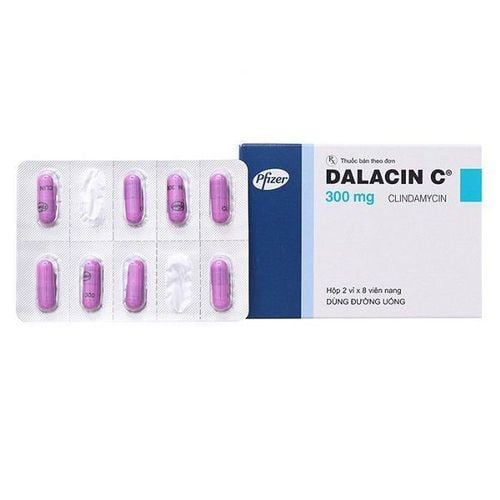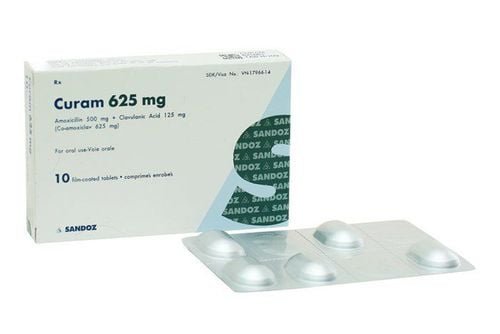Dalacin C is effective in treating infections caused by sensitive anaerobic bacteria. It can be used for both children and the elderly. However, pregnant or breastfeeding women should exercise caution when using this medication.
1. What is Dalacin C?
Dalacin C, also known as Clindamycin, is available in two forms: hard capsules and injectable solution. It contains Clindamycin, with a dosage of up to 300 mg. This compound can eliminate sensitive anaerobic bacteria and sensitive gram-positive aerobic bacteria (Staphylococcus, Streptococcus, Pneumococcus).
2. Uses of Dalacin C
Dalacin C is effective in treating bacterial infections, including:
Upper respiratory tract infections: Tonsillitis, sinusitis, scarlet fever (mainly in children), pharyngitis, otitis media.
Lower respiratory tract infections: Lung abscess, pneumonia, empyema, bronchitis.
Skin and soft tissue infections: Abscesses, wound infections, acne, boils, impetigo, cellulitis... Particularly, for cases of erysipelas or paronychia, treatment with Dalacin C shows good recovery potential.
Bone and joint infections: Septic arthritis, osteomyelitis.
Gynecological infections: Tubo-ovarian abscess, endometritis, cellulitis, salpingitis (requires combination therapy for effective treatment), bacterial vaginosis. For cervicitis caused by Chlamydia trachomatis, using medication containing Clindamycin alone can eliminate the bacteria.
Intra-abdominal infections: Abdominal abscess or peritonitis, septicemia, endocarditis.
Oral cavity infections.
Pneumonia caused by Pneumocystis jiroveci in AIDS patients.
Additionally, Dalacin C can be used in the treatment of malaria or for the prophylaxis of endocarditis.
Since this is a prescription medication, you should only use it under the guidance of a doctor.

3. How to Use Dalacin C
In addition to understanding "What is Dalacin C?", knowing how to use it properly is crucial for safety and effectiveness. For capsules, take them orally. The recommended dosage is 300 mg per dose. You can take it at 6, 8, or 12 hours (during the day) or 8, 12 hours (during the day). Drink a full glass of water with the medication to avoid esophageal irritation.
Pharmacokinetic studies have shown that under normal liver and kidney function (depending on age), there is no significant difference between young and elderly patients. Therefore, dosage adjustment is unnecessary for the elderly, even in cases of renal impairment.
For children under 1 year or weighing less than 10 kg, the recommended dosage is 37.5 mg every 8 hours in oral solution form.
There are differences in dosage for certain conditions:
Beta-hemolytic streptococcal infections: Use the same dosage as above, continuously for at least 10 days.
Cervicitis (caused by Chlamydia trachomatis): Take 600 mg, three times a day, continuously for 10 to 14 days.
Tonsillitis or pharyngitis (caused by streptococcal bacteria): Take 300 mg, twice a day, for 10 days.
4. Side Effects of Dalacin C
While Clindamycin offers many benefits, it can also cause side effects such as pseudomembranous colitis. This condition occurs because Clindamycin eliminates gut bacteria, and it can be more severe in elderly patients or those with impaired kidney function. Severe pseudomembranous colitis can be fatal.
Some symptoms that may appear include: bloody stools, mucus in stools, diarrhea, abdominal pain, fever, and rarely, white patches on the colon mucosa during rectal examination.
Additionally, a few patients may experience gastrointestinal side effects such as vomiting, nausea, abdominal pain, and diarrhea. Rare symptoms include injection site reactions, thrombophlebitis, urticaria, eosinophilia, esophagitis, and reversible neutropenia.
5. Precautions When Using Dalacin C
Patients with diarrhea or a history of allergy to any component of the drug (especially Clindamycin) should not use Dalacin C.
In some cases, severe hypersensitivity reactions may occur (e.g., toxic epidermal necrolysis, acute generalized exanthematous pustulosis). If severe reactions occur, discontinue the medication and seek alternative treatments.
You should know that antibiotic treatment can alter the colonic flora, allowing Clostridia to overgrow and cause pseudomembranous colitis.
Studies have shown that most antibiotics can cause mild to moderate diarrhea, with severe cases potentially leading to death.
When using the medication for an extended period, it is best to monitor liver and kidney function, as well as blood counts, because prolonged use of Clindamycin can lead to the overgrowth of certain organisms, particularly fungi.
Pregnant and breastfeeding women should exercise caution when using Dalacin C and consult a specialist for proper guidance.
During treatment, it is advisable to limit the use of stimulants such as alcohol, tobacco, etc.

6. Proper Storage of Dalacin C
Store Dalacin C at room temperature, away from moisture and direct sunlight. Do not store it in the bathroom or freezer. Each medication has specific storage instructions, so always read the usage guidelines carefully.
Dalacin C is a medication with many benefits for treating bacterial infections. However, it can also cause unwanted side effects if not used correctly. Therefore, it is essential to consult a doctor or specialist before starting any medication to get the best advice.
Please dial HOTLINE for more information or register for an appointment HERE. Download MyVinmec app to make appointments faster and to manage your bookings easily.













